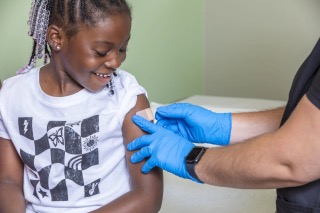**Please Review Updated Protocol**
TULSA, OK – [August 27, 2015]– Tulsa County residents spending more time outdoors during the nice weather also have the opportunity to come into contact with Oklahoma wildlife, including those that may be carriers for rabies such as dogs, cats, ferrets, skunks, bats or wild carnivores. However, it is important to remember that it is highly unlikely that people will contract rabies if bitten by one of these animals.
There has never been a human case of rabies reported to the Tulsa Health Department in Tulsa County. THD encourages everyone to vaccinate domestic animals, such as dogs or cats against rabies, and to avoid contact with wild animals. If you are bitten by one of these animals, and their owners do not have a record of rabies vaccination, the animal should be quarantined and observed for 10 days. The medication to prevent rabies after a bite is only necessary if specific criteria are met. You can call THD at 918-582-9355 and ask to speak to an epidemiologist for evaluation of rabies risk and guidance on submitting an animal for testing.*
Although rabies symptoms can vary, it is important to be suspicious of the following behaviors in animals:
An animal that appears to be ill
A wild animal that appears more tame than you would expect
An animal that’s having trouble moving or may even be paralyzed
Unusual or inappropriate aggression (without being provoked)
Rabies is a viral disease that affects the central nervous system and is almost always fatal once symptoms of the disease have started. Rabies virus is found in the brain, spinal cord, and saliva of infected animals and is transmitted through a bite or opening in the skin or mucous membranes (eyes, nose, or mouth).
Oklahoma rules and regulations require that a veterinarian vaccinate dogs, cats, and ferrets against rabies by the time the animal is 4 months of age, but the vaccines can be safely given at 3 months of age. When to revaccinate depends upon the documentation of previous vaccines, age of the animal, type of vaccine administered, and city licensing codes. Rabies vaccines for horses, sheep, and cattle are also available and recommended for show animals and all valuable breeding stock.
When pets are unvaccinated, or their vaccinations are out-of-date, their owners have some very tough decisions to make if their pets are exposed to a rabid animal. In order to prevent the continued spread of rabies, public health law requires that unvaccinated animals exposed to rabies are either quarantined at a veterinarian’s office for six months or euthanized, at the owner’s expense.
The Public Health Laboratory (PHL) at the Oklahoma State Health Department (OSDH) will test animals for rabies if people or other animals have been exposed. “Exposed” could mean the following:
The animal bit a person or another animal
Another animal is known or suspected to have bitten the animal in question,
Saliva from the animal has come in contact with a person or another animal’s broken skin or mucus membranes (a naturally moist part of the body such as eyes or mouth)
If you suspect your animals have been exposed to rabies, immediately contact the local animal control officer or Tulsa Health Department epidemiology department at 918-582-9355. For more information about rabies, visit the OSDH website at www.ok.gov/health or talk to your veterinarian.
*As of 2025, this is outdated. Please Review Updated Protocol




